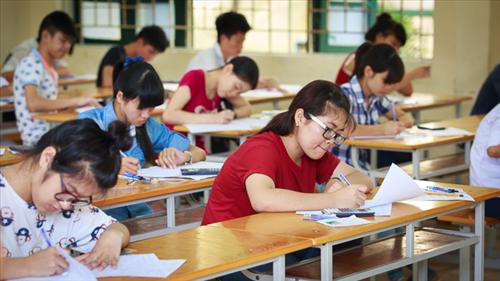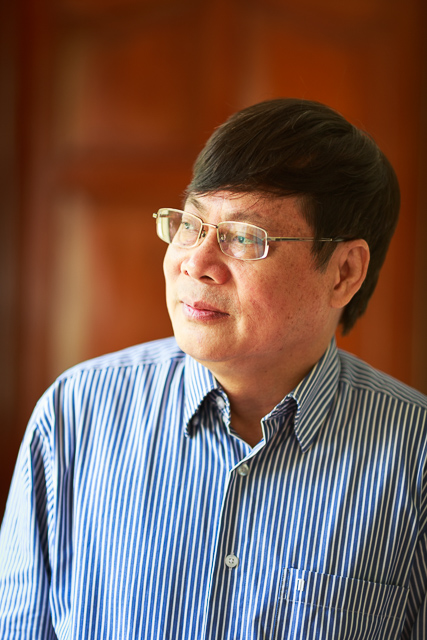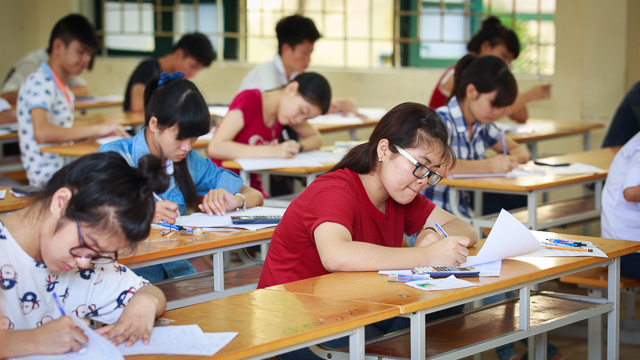

Professor Tran Hinh (Faculty of Literature). (Photo: Thanh Long/USSH)
- Some have commented that this year's Literature exam for khối C and D was quite good and a bit surprising. What are your thoughts, teacher?
It's really difficult to say whether the exam was good or not. All I can say is that the exam followed the Ministry's guidelines, which is to gradually eliminate rote learning, learning according to patterns, and learning in cram schools. As for whether the exam had any creativity or surprises? I think there were some surprises. For example, in the 2-point question, both the C and D exam papers chose excerpts from two supplementary readings instead of the main lessons ("Đò Lèn" by Nguyễn Duy and "Đất nước" by Nguyễn Đình Thi). The reading comprehension questions for these two questions also eliminated rote memorization. They forced students to learn by understanding. If students learn from this experience, they should remember to study by understanding. If they study in this way, the exam wouldn't be surprising or difficult for them at all.
- As many people predicted, this year's Literature exam continues the trend of innovation seen in recent years, while also adding some new features: no multiple-choice questions; the questions are not heavily focused on knowledge but rather on synthesis and commentary; and the social commentary essay continues to address current pressing social issues. What are your comments on these changes?
First, regarding the social commentary essay question, I think the way it's asked isn't anything new. The essay topic will focus on essential current issues (the South China Sea, territory, patriotism, war, revolution, ideals, the meaning of life for young people today...). The exam for Group C touches on the South China Sea issue, though not directly, but through the "use of military force" by the Chinese ruling class. The exam for Group D discusses the issue of "contribution versus enjoyment," which I think is still related to the current issue of "the meaning of life." The essay question is not difficult for the candidates. I can confirm that.
Regarding the essay question (5 points), I think it's nothing new. This type of question has been seen for many years now. In particular, last year's exam was quite similar. The only difference is that the chosen work wasn't the same as the previous year. However, while it's not new, I strongly support this approach to exam questions in recent years. This type of question will gradually discourage students from studying Literature as they do in cram schools. This style of question should have been implemented long ago, instead of waiting until the "disaster" of cram schools is seen before trying to eliminate it.
- Does the exam strike a balance between literary knowledge and real-world applications? Would an exam like this be effective in assessing the candidates' literary abilities, sir?
It's difficult to say what constitutes a "sufficient dose" of current practical and academic content. We also shouldn't overly advocate for exam questions that heavily emphasize social commentary. But we also need to avoid superficial teaching and learning of literature that only chases after "beautiful writing." Literature is something very subtle; sometimes it is life itself, and sometimes it is purely literature. The issue is how we choose to teach and learn. Therefore, I think that in addition to teaching and learning methods and question design, the most important factor is the way teachers evaluate (grade) students. For many years, I've heard many people complain that current exam grading is so "risky." Students whisper to each other that when taking exams, you should try to write as long as possible, because the longer the better. Is this true? I'm not saying it's all true, but it's basically the case. Why is that? Because teachers grading literature nowadays often only skim through the essays (which is due to the excessively long exam questions and the tutoring centers), so if the essay is long, they don't dare give a low grade. Of course, I don't think all teachers are like that. There are still teachers (younger ones) who read each essay very carefully, and older teachers who have more experience. Therefore, they still give low grades to long essays because the work doesn't directly address the exam question.
In short, to thoroughly reform the examination system, I think a comprehensive overhaul is needed: shorter exam questions (to prevent students from writing lengthy essays), completely eliminating the practice of copying model essays (eliminating rote learning centers), and longer grading periods (instead of the 10 days to 2 weeks stipulated by the Ministry)... Only then can we eliminate the "risks" in grading exams in general, not just in Literature.

(Photo: Jackie Chan/USSH)
- It has been observed that this year's social science exams have eliminated the optional section, resulting in a standardized exam format. The content of the Literature, History, and Geography exams all address issues related to maritime territories, the struggle to protect sovereignty, and regional security – all current hot topics. Does this trend foreshadow a shift in the thinking behind teaching and learning social science subjects?
Essentially, eliminating the elective section means abandoning the standard and advanced curriculum. This means that if this exam format is officially implemented this year, there will be no need to divide students into two groups anymore. This is also a way to reduce the curriculum load, as many people desire. There will only be one textbook. As for the issue of islands and sovereignty, I think it's just like many other issues, such as patriotism, revolution, the meaning of life, tolerance – there are many, many more. It will always be present. It's a matter of both textbooks and life. In my opinion, this way of teaching and learning Literature is the right direction.
- With this exam, can you predict the score distribution?
I find this a difficult question, because the distribution of scores depends on how the teachers grade. Last year, I was confident the exam scores would be low, but the cut-off scores for the University of Social Sciences and Humanities were the same as in previous years. Teachers keep saying students' papers always follow a "template," but I have a feeling their grading methods are partly geared towards that. Therefore, I see students taking the C-block exams this year complaining about the difficulty, but just wait and see, the minimum admission score for the University of Social Sciences and Humanities, Vietnam National University, Hanoi, will likely be 18 or 18.5 or higher.
Thank you, teacher.
Author:Thanh Ha
Newer news
Older news